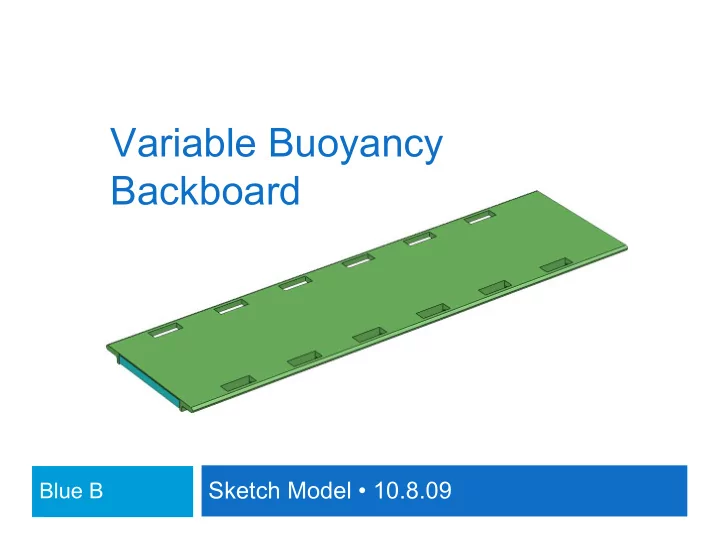

Variable Buoyancy Backboard Sketch Model • 10.8.09 Blue B
What is a backboard?
What’s wrong with current backboards?
Our Concept: Variable Buoyancy •stage one: neutrally buoyant •easy to position under victim •stage two: buoyant •once positioned, inflate bladder for easy rescue
Our Design
Who needs our backboard? •270,000+ public pools in the United States •All legally required to have a backboard •Red Cross trains more US lifeguards than any other organization
Benchmarking •Standard Backboards: $150 to $300 •Similar Patent: Neutral Buoyancy Recovery Device US Patent 6,352,460 (not on market) bottom panel
Feasibility of Variable Buoyancy •What is our desired buoyancy? •What bladder volume gives our desired buoyancy? •Can this volume fit within the dimensions of a standard backboard? •Can the backboard carry enough compressed CO 2 to displace this volume of water? •Is a neutrally buoyant backboard still light enough to handle easily on land?
Feasibility of Variable Buoyancy •What is our desired buoyancy? 200 N (20 kgf or 45 lbf) •What bladder volume gives our desired buoyancy? 17 L displaces 17 kg of water (plus 3 kgf of initial buoyancy) 3 kgf + 17 kgf = 20 kgf Initial H20 Total buoyancy displaced buoyancy
Feasibility of Variable Buoyancy
Feasibility of Variable Buoyancy •Can this volume fit within the dimensions of a standard backboard? Yes: current bladder dimensions of 167 cm x 36 cm x 3.2 cm •Can the backboard carry enough compressed CO 2 to displace this volume of water? Yes: one 36-g canister of CO 2 provides necessary volume
Feasibility of Variable Buoyancy •Is a neutrally buoyant backboard still light enough to handle easily on land? Yes: projected weight of 7.5 kg (16.5 lbs)
Where Do We Go From Here? •Separate bladder chambers for balance control •Redundant controls •Retractable, reconfigurable straps •Even smaller initial backboard volume and weight
Recommend
More recommend